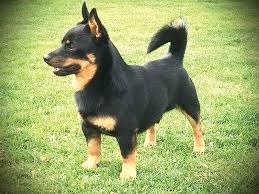
Lancashire Heeler
Conditions of detention
Lancashire Heelers are adaptable and can live comfortably in various environments, including apartments, as long as they receive regular exercise and mental stimulation.
Useful Fact: They thrive in homes where they are involved in daily activities and given opportunities to use their herding instincts, such as through agility or obedience training.
Nutrition and diet
Lancashire Heelers require a balanced diet rich in high-quality proteins, fats, and essential nutrients. High-quality commercial dog food or a carefully planned homemade diet is recommended.
Useful Fact: Due to their active nature, it’s important to monitor their food intake to prevent obesity and ensure they receive adequate nutrition for their energy needs.
Health
Lancashire Heelers are generally healthy but can be prone to certain genetic conditions such as primary lens luxation and Collie eye anomaly. Regular veterinary check-ups are crucial.
Useful Fact: With proper care and a healthy diet, Lancashire Heelers can live an average lifespan of 12-15 years.
Grooming and care
Lancashire Heelers have a short, weather-resistant double coat that is easy to maintain. Their coat typically comes in black and tan or liver and tan.
Useful Fact: Regular brushing once a week helps remove loose hair and keep their coat healthy. Bathing should be done as needed.
Education and training
Lancashire Heelers are intelligent and eager to please, making them relatively easy to train. They excel in obedience training, agility, and various dog sports.
Useful Fact: Early socialization and positive reinforcement techniques work best with this breed, as they respond well to praise and rewards.
Toys and entertainment
These dogs enjoy toys that challenge their minds and bodies. Interactive toys, puzzle feeders, and activities that mimic herding, such as fetch and agility games, are excellent for keeping them entertained.
Useful Fact: Regular exercise and mental stimulation are crucial to prevent boredom and destructive behavior in Lancashire Heelers.
Safety
Lancashire Heelers are friendly and generally get along well with other animals and people. However, they should always be supervised around unfamiliar animals and young children to ensure safety.
Useful Fact: Early socialization helps Lancashire Heelers become well-mannered and adaptable in various situations.
Accessories
Invest in a sturdy leash, a comfortable collar or harness, and a cozy bed. Lancashire Heelers also benefit from having a variety of toys to keep them mentally stimulated.
Useful Fact: A high-quality, adjustable harness provides better control during walks and is more comfortable for the dog.
Socialization
Early and ongoing socialization is crucial for Lancashire Heelers to develop into well-rounded adults. Exposure to different people, animals, and environments is beneficial.
Useful Fact: Regular socialization helps reduce fearfulness and ensures they remain friendly and well-adjusted.
Travel and Transportation
Lancashire Heelers generally travel well if properly acclimated. Use a secure crate or dog seat belt for car travel, and ensure they have access to water and regular breaks.
Useful Fact: Lancashire Heelers enjoy outdoor adventures and can be excellent travel companions for hiking and camping trips.
Behavior and psychology
Lancashire Heelers are known for their lively, intelligent, and independent nature. They require mental and physical stimulation to stay happy and balanced. Without proper engagement, they may develop behavioral issues.
Useful Fact: Daily exercise and mental challenges can significantly improve their overall behavior and well-being.
Legal aspects
Check local regulations regarding dog ownership, as some areas may have specific laws concerning pet licensing and leash use. Licensing and regular vaccinations are usually required.
Useful Fact: Always keep your dog’s identification and vaccination records up to date to comply with local laws and ensure their safety.


